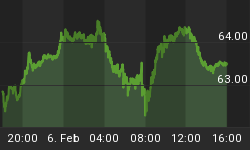In articles and media appearances during the past several weeks, we've hinted that there are fundamental problems with the economy and the market. While we have often traced these back to poor policy, they are important to consider in and of themselves.
First and foremost is the lack of asset-derived income (e.g.: interest; dividends) that we have covered in detail previously. It is still worth mentioning the lack of compensation to investors by corporations through transfer of earnings as interest payments or dividends. While many recognize the lack of interest paid on CDs and savings accounts, it's important to note that portfolio earnings have not risen with stock prices over the past 2 years.
Many have argued for continued bullishness in the markets, which seems unlikely. These optimists have pointed to, among other things, below-average Price/Earnings ratios of stocks. While it is true that published P/Es have not been outlandish, these metrics are based on several assumptions; namely some presumed growth rate for earnings. Still more significant, however, is the lack of transfer of these earnings to investors.
Not only were these P/E ratios calculated weeks ago - before all the bad economic data we've seen recently - but they are predicated on those earnings being transferred to shareholders. After all, when investors buy shares of stock, what they're really paying for is a share of a company's future earnings. If companies have no intentions of sharing those earnings, they're hardly worth as much to investors.
Another factor that had been driving stock and commodity prices higher was investors' growing fears of inflation and their motivation to hold assets that might maintain their values through several rounds of quantitative easing.
It is true, unfortunately, that inflation has been a problem over the past two years. The problem, though, is not that we've had excess inflation, but that we haven't had any at all (as defined by growth in money supply).
In fact, over the past two years we would have welcomed inflation. It would have been preferable to see money supply growth and have that money turning over in the economy. Perhaps then the US economy might've been in as good a shape as everyone thought it was three months ago.
Instead, the majority of the past two years has brought debt deleveraging and negative money supply growth. Companies and individuals have been hoarding cash; though God knows what they're doing with it, since it hasn't been reflected in savings rates. Most likely they've been using it to pay down debt.
Now, after months of making our anti-inflation argument, it appears we're on the verge of validation - from food stuffs, no less. For those who missed this riveting story, the United States this year has seen the second largest planting of corn crops in nearly 70 years. The news pushed down agricultural futures prices, and further declines are expected.
Oddly enough, corn prices were one factor we used repeatedly in arguing that inflation was nonexistent; pointing out that prices had risen not as a result of growth in money supply (which would have been inflationary), but due to simple lack of supply.
Echoes of this story can be heard elsewhere in the market - in gas prices, for instance. In just the past several weeks prices at the pump have fallen more than 10%. If prices of food stuffs continue to fall after gasoline, where, then, is the argument for inflation?
The answer, friends, is that there is no inflation - not now, anyway. Inflation might have actually worked to hold up prices for stocks and commodities in recent weeks. Instead we've seen a significant correction in stocks on a wave of poor economic data.
GDP growth, for instance, has slowed to a snail's pace. The latest numbers released were recently revised down to 2.3%. If year-over-year GDP growth dips below 2%, ![]() history will show a recession is a near certainty.
history will show a recession is a near certainty.
At this point, a recession on the heels of the 2008 financial crisis and stock market collapse, housing market bubble burst, home construction drop-off; and in the midst of a European financial crisis spearheaded by Greek default, and a slide in US manufacturing and production, could be catastrophic. Certainly a little inflation over the past couple of years would've been preferable.















